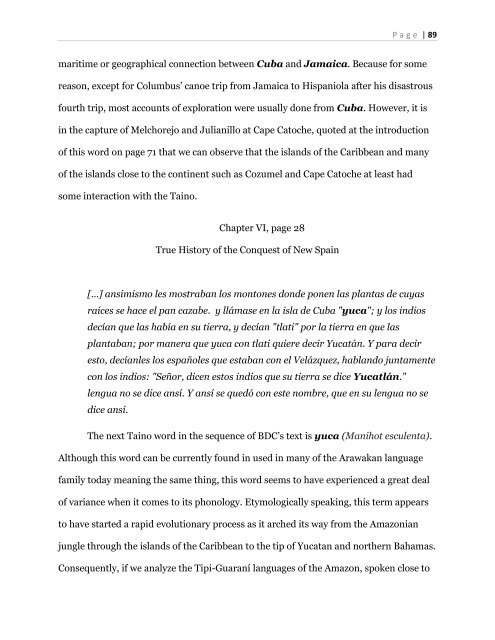Language of the Voiceless: Traces of Taino Language, Food, and Culture in the Americas From 1492 to the Present
by Leonardo Nin
by Leonardo Nin
Create successful ePaper yourself
Turn your PDF publications into a flip-book with our unique Google optimized e-Paper software.
P a g e | 89<br />
maritime or geographical connection between Cuba <strong>and</strong> Jamaica. Because for some<br />
reason, except for Columbus’ canoe trip from Jamaica <strong>to</strong> Hispaniola after his disastrous<br />
fourth trip, most accounts <strong>of</strong> exploration were usually done from Cuba. However, it is<br />
<strong>in</strong> <strong>the</strong> capture <strong>of</strong> Melchorejo <strong>and</strong> Julianillo at Cape Ca<strong>to</strong>che, quoted at <strong>the</strong> <strong>in</strong>troduction<br />
<strong>of</strong> this word on page 71 that we can observe that <strong>the</strong> isl<strong>and</strong>s <strong>of</strong> <strong>the</strong> Caribbean <strong>and</strong> many<br />
<strong>of</strong> <strong>the</strong> isl<strong>and</strong>s close <strong>to</strong> <strong>the</strong> cont<strong>in</strong>ent such as Cozumel <strong>and</strong> Cape Ca<strong>to</strong>che at least had<br />
some <strong>in</strong>teraction with <strong>the</strong> <strong>Ta<strong>in</strong>o</strong>.<br />
Chapter VI, page 28<br />
True His<strong>to</strong>ry <strong>of</strong> <strong>the</strong> Conquest <strong>of</strong> New Spa<strong>in</strong><br />
[…] ansimismo les mostraban los mon<strong>to</strong>nes donde ponen las plantas de cuyas<br />
raíces se hace el pan cazabe. y llámase en la isla de Cuba "yuca"; y los <strong>in</strong>dios<br />
decían que las había en su tierra, y decían "tlati" por la tierra en que las<br />
plantaban; por manera que yuca con tlati quiere decir Yucatán. Y para decir<br />
es<strong>to</strong>, decíanles los españoles que estaban con el Velázquez, habl<strong>and</strong>o juntamente<br />
con los <strong>in</strong>dios: "Señor, dicen es<strong>to</strong>s <strong>in</strong>dios que su tierra se dice Yucatlán."<br />
lengua no se dice ansí. Y ansí se quedó con este nombre, que en su lengua no se<br />
dice ansí.<br />
The next <strong>Ta<strong>in</strong>o</strong> word <strong>in</strong> <strong>the</strong> sequence <strong>of</strong> BDC’s text is yuca (Manihot esculenta).<br />
Although this word can be currently found <strong>in</strong> used <strong>in</strong> many <strong>of</strong> <strong>the</strong> Arawakan language<br />
family <strong>to</strong>day mean<strong>in</strong>g <strong>the</strong> same th<strong>in</strong>g, this word seems <strong>to</strong> have experienced a great deal<br />
<strong>of</strong> variance when it comes <strong>to</strong> its phonology. Etymologically speak<strong>in</strong>g, this term appears<br />
<strong>to</strong> have started a rapid evolutionary process as it arched its way from <strong>the</strong> Amazonian<br />
jungle through <strong>the</strong> isl<strong>and</strong>s <strong>of</strong> <strong>the</strong> Caribbean <strong>to</strong> <strong>the</strong> tip <strong>of</strong> Yucatan <strong>and</strong> nor<strong>the</strong>rn Bahamas.<br />
Consequently, if we analyze <strong>the</strong> Tipi-Guaraní languages <strong>of</strong> <strong>the</strong> Amazon, spoken close <strong>to</strong>


















